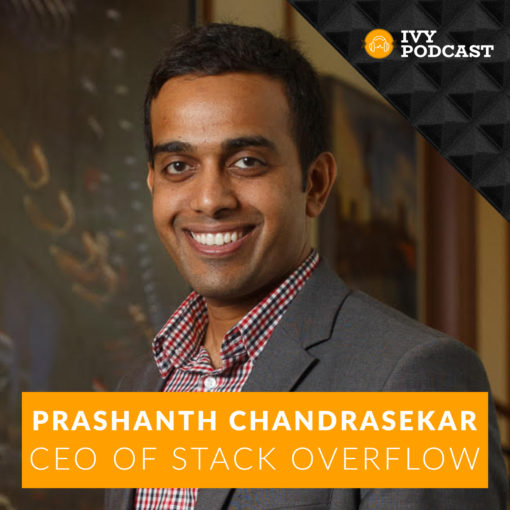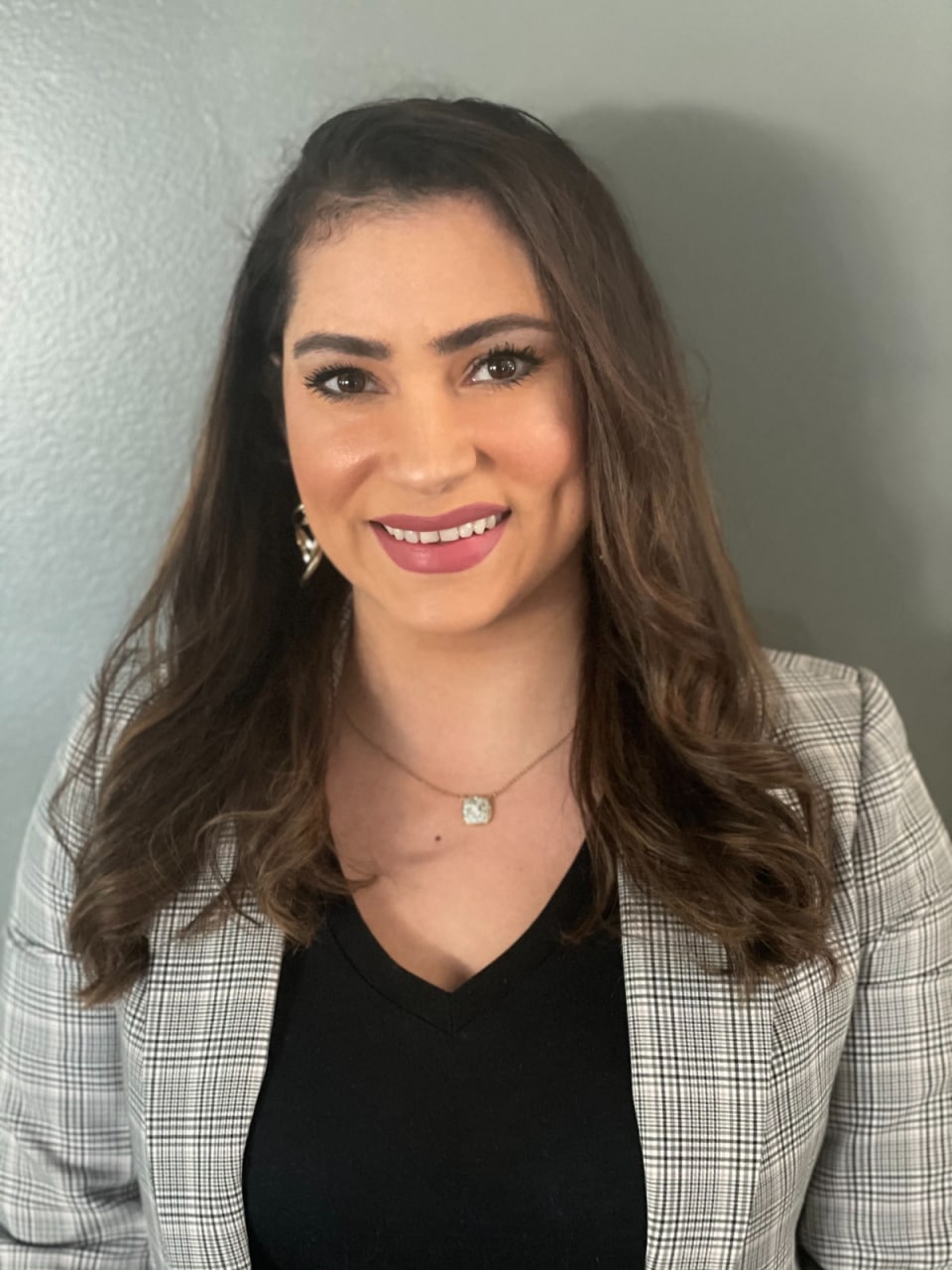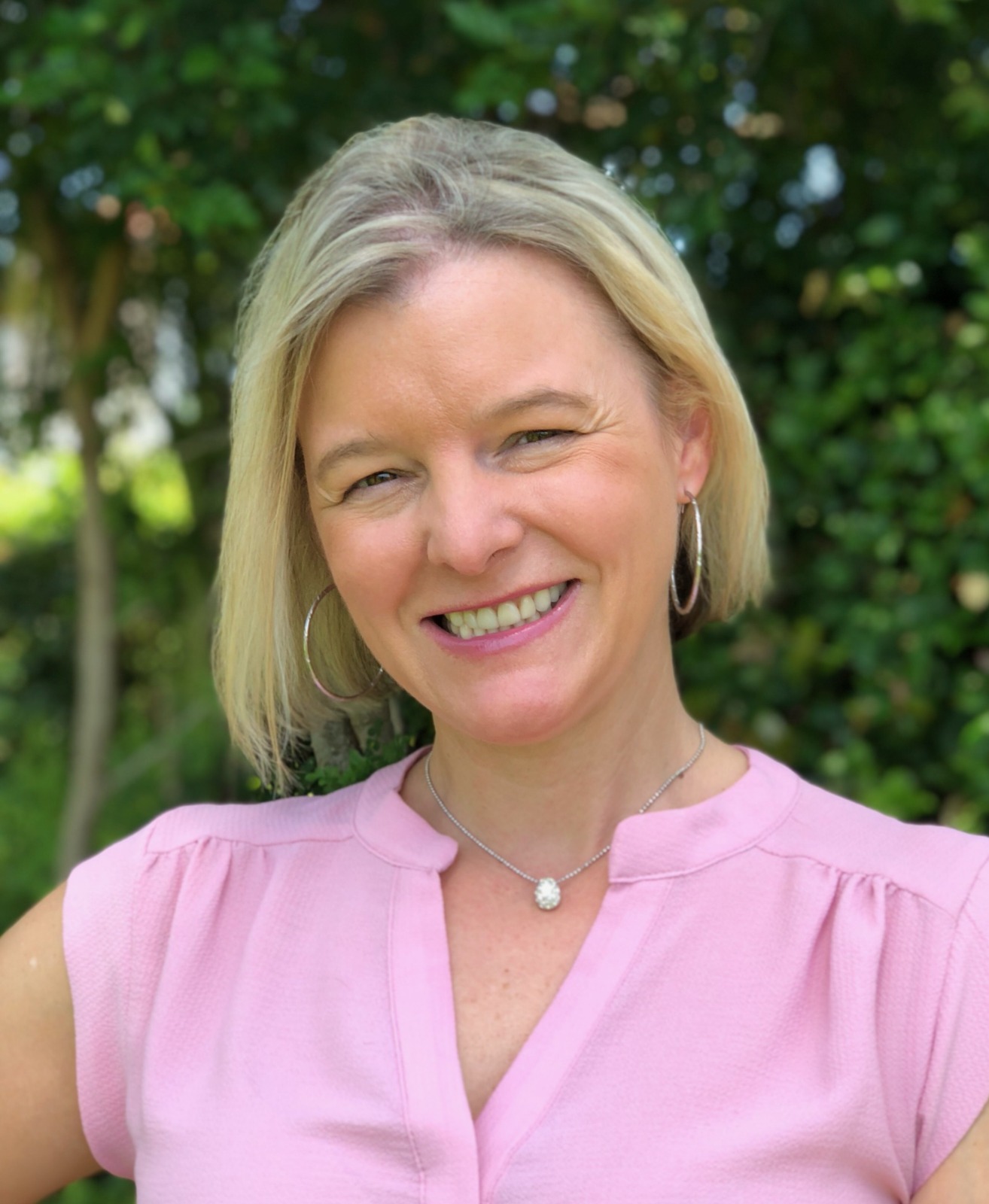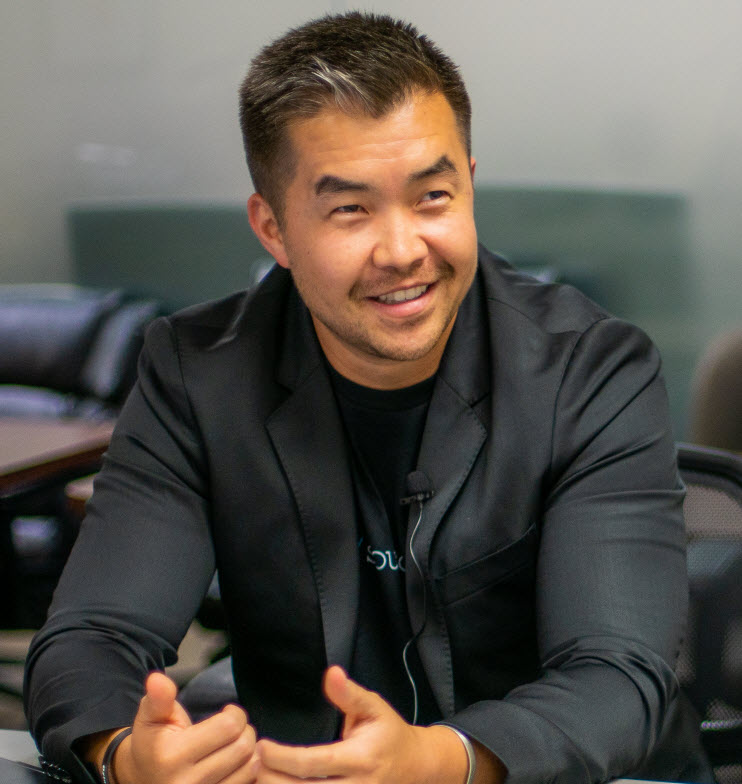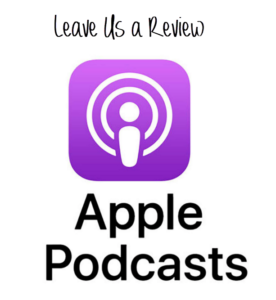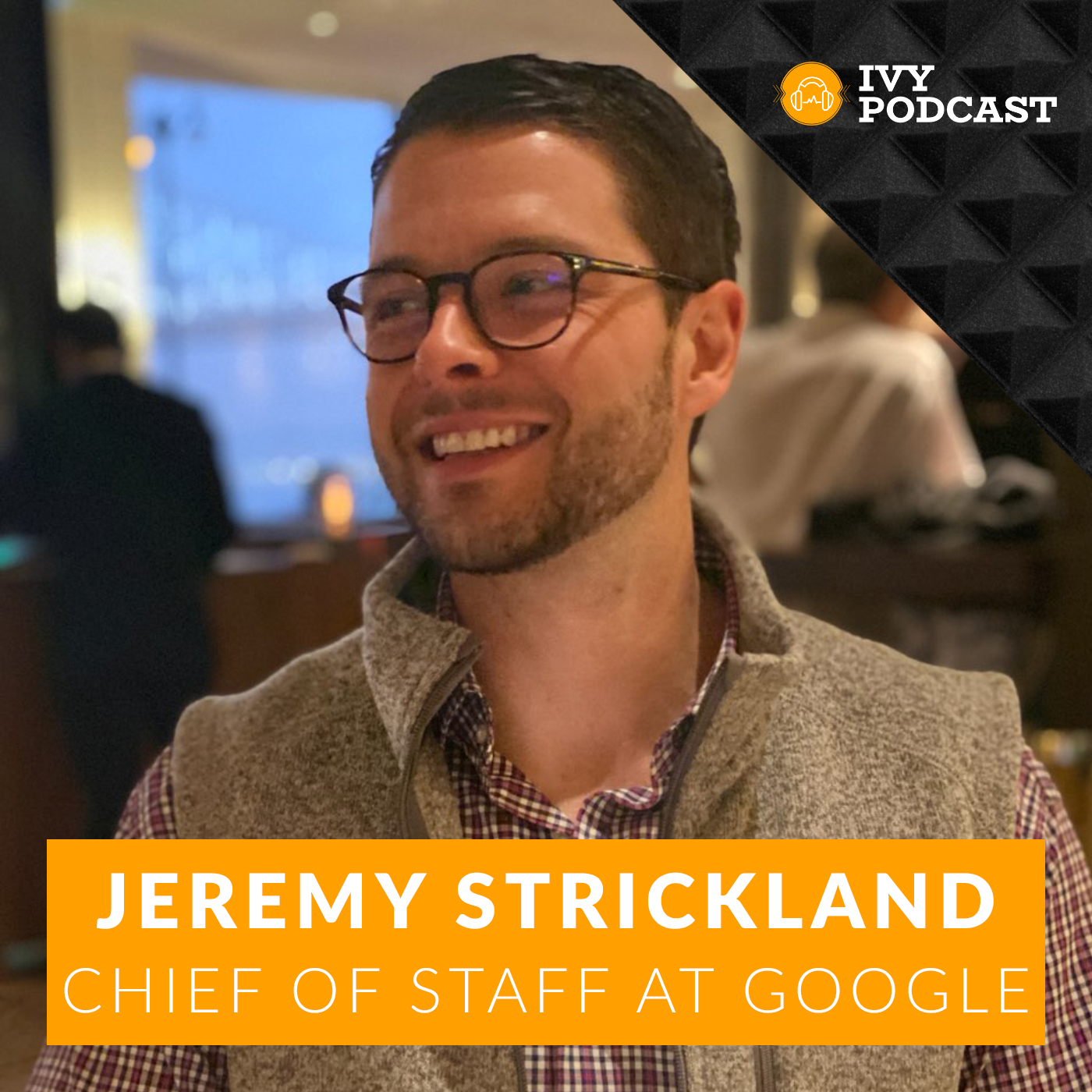
Jeremy L. Strickland currently serves in the role of Chief of Staff at Google. Prior to returning to Google, where Jeremy also began his career, he worked as a Sales Innovation Manager at LinkedIn and in investment banking at Goldman Sachs. Prior to that, Jeremy completed the MPP / MBA degree program at Kellogg and Harvard and has also studied at Vanderbilt (undergraduate) and Stanford.
Having worked in Silicon Valley for nearly a decade, Jeremy brings a diverse set of experiences and background to his role as Chief of Staff, making him a valuable contributor capable of advising on a wide spectrum of issues, ranging from business drvau and product strategy to financial design to public policy.
Outside of his role at Google, Jeremy advises start-ups and is currently working w/ the leadership of Pied Parker, a quickly growing start-up in the transportation / parking sector. Outside of the office, Jeremy (and his wife Grace) compete in CrossFit competitions, loves Atlanta Braves baseball, and holds a single-digit golf handicap.
Episode transcription:
[00:00:00] Jeremy Strickland: [00:00:00] Hi, this is Jeremy Strickland. I'm the chief of staff at Google. [00:00:18] Jahn Karsybaev: [00:00:18] Jeremy, thanks so much for finding time. Joining us on the Ivy Podcast this Friday afternoon, April 30th. The reason I included the date is because lately I've been getting some comments around that some of the episodes appear to be maybe a little out of date or maybe not within the trends. So we started doing that. Where are you based? [00:00:40] Jeremy Strickland: [00:00:40] Yeah. So I'm based out of San Francisco but due to COVID reasons, my wife and I have been coveting as we like to say in gross point, Michigan, which is about 20 minutes outside of Detroit. [00:00:53] Jahn Karsybaev: [00:00:53] Oh, very cool. Well, in a completely different location, right. I want to spend some time talking about your current role within the [00:01:00] organization, but before we do that, tell us a little bit more kind of the thumbnail version of your career. [00:01:06] Jeremy Strickland: [00:01:06] Yeah, absolutely. So I guess I'll start with my, kind of my first job undergrad. So I graduated from Vanderbelt in 2011. And then I joined Google for the first time. So I immediately came to Google as part of their new graduate program. I spent two years doing small and medium, Sales and support before transitioning to a more analyst or operational type role. I spent roughly around six months as a business analyst, before transitioning to a strategy and operations lead. This latter role was really kind of my favorite time at Google. So working on super complex projects with really high performing individuals. In total, I was at Google for about five years before I went to graduate school. I did my MBA at Kellogg and then a master's of public policy at the Harvard Kennedy school over a three-year [00:02:00] period. After that, I briefly joined LinkedIn where I was a manager on our sales innovation team before a recently returning to Google and my current role as chief of staff, which is just an ideal and perfect role. [00:02:16] Jahn Karsybaev: [00:02:16] That's awesome. What are quite diverse backgrounds and appreciate you sharing? Tell us a little bit more about the role as a chief of staff. I understand what falls under your purview and the responsibility, especially the last few years. That role has been gaining a lot of grounds in terms of a lot of organizations racing, the specific need for that, but not a lot of people may be familiar with that. The overall concept shares a little bit more insight into the day to day responsibilities. What falls under your purview? [00:02:49] Jeremy Strickland: [00:02:49] Yeah, absolutely. There's so much to just unpack there, but it really is a super exciting role. The first thing that I like to tell people about being a chief of staff [00:03:00] is this role is not for everyone, right? The pace of this role is just really, really intense. So the only thing that I can equate it to is, I did investment banking at Goldman for my internship. It's that pace, but not quite as long of the hours, but you're always on call. So some of their phrases that I like to describe the chief of staff job that I think resonate with other people in this role are you're an inch deep on many projects, but you're about two miles wide. So one of the things that my executive and I do on a weekly basis is we just review the priorities of my project. And I think at one point I was up to 30 different projects that I was touching or helping to manage or helping to manage the managers on those projects. And so I think that's really interesting. You have to keep this rotation. Of what is most important, what's going to drive the most value for the business. And if I can only work, [00:04:00] , 60, 70, 80 hours a week, where is it that I'm going to spend my time? And so I think that's super interesting. So in terms of like chief of staff, so it's definitely been growing in Silicon valley over the last few years in terms of interest, I think as more and more tech companies begin to grow, they start to understand and realize that the founder all fit is not the executive who is going to be able to kind of grow and scale the company. And so the type of value that someone like myself can bring is really kind of that go-between helping provide. Operational rigor, strategic insight and just kind of being able to scale that, that executive, right. And so I have the good fortune of doing this at Google. So I work for a leader who has been at Google for gosh, over a decade. She's a phenomenal leader. She's a great people manager and she understands her business [00:05:00] better than anybody I've ever worked for. And it is truly exciting and inspirational to see how she operates. So with that in mind I'm happy to go into more of like day-to-day responsibilities, but I'll toss it back to you. In case you may have a specific area you want to. [00:05:19] Jahn Karsybaev: [00:05:19] No, I love that. I love and appreciate the background and the insight more into the specific role. And I agree, definitely, especially in our circles, in the technology startup community or technology organizations have been growing trends. But I also see, I interact with a lot of executives at other industries and other organizations and have been definitely getting grounds as far as that particular functional domain within the organism. Tell us a little bit more about the career path. He seems like you were at the executive level, you interact mostly with executives. So you do a lot of advising and coaching almost to a certain extent. [00:06:00] What's the path to chief of staff and beyond. [00:06:04] Jeremy Strickland: [00:06:04] Yeah, absolutely. So I can talk about my path here. And so coming out of business school, I took what was basically just like a managerial position at LinkedIn. And LinkedIn is a really great firm, but I just didn't feel that that was the right role that played to my talents. I think I'm somebody who does really well when I have a bunch of different projects on my plate and can navigate among those different products. And I enjoy that a lot more than having to go really, really deep into projects. So what I didn't love about the kind of manager position that I had at LinkedIn was as we were working on the CRM migration and I was helping to lead that project, a huge, critically important project. But I just wasn't super interested or motivated by the way. And so when I transitioned to Google on, was thinking about, or before I even transitioned to Google what my next role would be, did it make sense to move from [00:07:00] like a people management position and to something at the back to where I would be an individual contributor again. And so the only thing that I could think of that really made sense to me was the chief of staff role. And the way that I think about it is most people in a chief of staff role because of the pace of the role. And just how strung out you are over all of your different projects, all of your different stakeholders. There tends to be a high burnout rate of about two to three years. So if you look at the most, same as the chief of staff role to the president I think the average tenure in that job is just a little over a year. And that's just because of the high nature or the high paced and just quick nature of the role. And so that was kind of, my plan was to come in support of this executive. It was an area that is growing very, very quickly, Google well-respected executives based on the due diligence that I did. And so that's ultimately how I ended up here. But I think, on my day to day, who do I interact with the most so [00:08:00] directly supports my executive. And then she has a set of basically head of heads or some, or some of which are at the director level that report to her. And predominantly I work with two or three of those basically hazard directors, more than others. So of that gosh, like six or seven, that report to her, I mainly focus on and help drive it, drive, work and value a couple of those more than others. So I think it's good because I get exposed. Yeah. Cross-functionally across all of everything that Google has to offer from marketing sales, engineering support implementation side of the business, et cetera. And it's kinda great because with like, thinking about moving from like a people manager role to like an individual contributor role with a chief of staff, something that somebody told me that didn't make sense until I got in this role is no one reports to you, but everyone reports to you. And so I think that's a [00:09:00] really interesting phrase to think about because while I'm not directly responsible for the performance manager of everyone, I have what I hope is the trust of my executive. And when I'm recommending something on a project, people tend to listen. And so that's a really great position to have. [00:09:21] Jahn Karsybaev: [00:09:21] Oh, that's very exciting. And it definitely paints a much bigger picture in terms of the area of responsibility as a chief of staff and being able to get so much exposure all across seems like the entire organization, different domain areas, different types of leadership within the organization that also creates a lot of opportunities for you to learn, absorb as much as possible. So I think that's super exciting. Tell us about any specific challenges that come along with that particular responsibility. What are some of the things that maybe you did not expect or something that was really, you did as much research as you could prepare yourself for that particular role, but what were some kind of the “aha” moments or someone that got you sort of. [00:10:09] Jeremy Strickland: [00:10:09] Yeah, absolutely. So I think it starts with, you have to have a clear vision of what your job is, right? And so my job is to basically scale the effectiveness of my executive. And I think that goes with the general kind of foundational value that I have of this role. So chief of staff, you are not achieved, you are staff, right? And your job is not to make decisions. Your job is to help the executive make the best and most informed decision. And so that means helping to guide, helping to inform, helping provide options, pushing back when you don't agree. Right. And doing so thoughtfully and respectfully. So what were some of the challenges that I faced? I think with anybody who's new to this role and had never been a chief of staff [00:11:00] before it's really learning how there is, what is the best way to gain their trust? Of your executive. I think that's something that I did pretty well. And the way that I did that was really trying to connect on a personal level and then really spending a lot of time with her direct reports getting to know them. So I set a personal goal for myself like my first 45 days in the role to meet with all of our important stakeholders. The end of that 45 days, I counted up the number of different one-on-ones that I have. I think I was at something like 52. And so that's just an incredible amount of time that I spent introducing myself, getting to know others, getting to know about people's families, their interest in their hobbies. And so I think that that was like one thing that I, that many people could potentially struggle with in this role is undervaluing. How important it is to be proactive and like your network. Now the thing that I found that was [00:12:00] just like, whoa, oh my gosh, this is over my head at this point is I mentioned a bit earlier being inch deep in a, in a couple miles. Those first couple of months, you're just trying to get up to speed. Right? You're trying to learn to lead through the product. You're trying to learn the personality. And you're given exposure to 15, 20 different projects, and you have no idea what many of the acronyms mean. Who were some of the key players? What are the kinds of historical precedents behind many of these projects? And so it was definitely the. The thing that I always mentioned to people, the experience for me was definitely the Dunning Kruger effect or Dunning-Kruger effect, which if you come in, you have a couple of quick wins. You add value. People are like, Hey, this guy's pretty smart. Like, maybe he can put some more operational rigor and then you get exposure and maybe you're on one or two products at that point, then you get exposure. To 20 or 30 different projects. And you're like, oh my God, I am like this sea of despair. I have no idea what I'm going to do. They are going to fire me in two weeks. I'm a big fraud. And then slowly over time, you just start building back up to where you hit like that, six month marker. So you feel pretty comfortable or you're like, all right, I have this, I have these 20 or so projects on my plate. I know the two or three that really matter. I know the two or three that I can completely like offload and that person's going to take care of. And then I know the ones that are like, people are going to tell me this is important, but it's not really that important. And so you kind of just like slowly build back up until you hit this like plaque. And then that plateau is like, you're feeling comfortable in your job. And then you start taking on new responsibilities, prepping for meetings and things you don't know about. So you have to do research on them that are kind of stretching you a little bit more and more. And so I think it's if you're familiar with the Dunning-Kruger effect, like, I definitely like to say that. Absolutely very true of this role, because you have like your, your valley of despair and like you think that you're a fraud, but , you're slowly come out of it. [00:14:10] Jahn Karsybaev: [00:14:10] Yeah, it definitely resonates. And as far as in terms of the lack of clarity around the specific responsibilities that you have to take on as the chief of staff, was that something that was a concern to you or do you on the opposite spectrum, do you actually operate it a lot better from that step? [00:14:33] Jeremy Strickland: [00:14:33] Yeah, so I think, one of the things that I've been told that I do well and. I think there's always room for improvement on anything you do well to be even better at it, is managed ambiguity. And I manage that through relentless prioritization. Like, look here are the projects that we're working on together. I think these are the top five. Let's confirm that, and that's what we do on a weekly basis. And then to say like, Hey, okay, how can I begin to drive value on this or these, this is the team that we need to build to work on this. Or am I leading this project or am I supporting right? And so I think what many people would be interested in is like for somebody in this room. What do I kind of do? And so I thought about, if my end goal is to scale the effectiveness of my executive, what are the levers that I have to do? So, and so I kind of think of those in like four big buckets and I'll just kind of break those down. I'm breaking the rule of three for all the consultants out there. So the first one is basically, thinking about strategic priorities, so really helping to identify major trends. In the business thinking about where we want the executive to basically plug in versus what I can lead. And then also just kind of generally acting as a gatekeeper. And I think of it as that filter for all of the requests that come in, so that's kind of, one is being, I call it the personal confidant of the executive or helping to set strategic priorities. The second one is really thinking about a program or project management, right? When you're a chief of staff, we have an organization that we've built and oftentimes there'll be projects that just don't fit very well within that organization. And so it requires somebody who has the purview and scope to sit across many of those directors or heads of industries that are the next level down and drive those projects. And then the third area is really, I would think like strategic planning and alignment, otherwise known as a really fancy way of just saying operational rigor. So one of the big things that we do is just basically just understand what is the process that we're doing for something that's really important today. What are the pain points? Where can we clean this up? Where can we streamline things? Where can we make it more efficient? And then it's really just asking the question of how we've done it in the past. Do we need to do it this way in the future? And one of the big projects that [00:17:00] I'm on right now, we had my predecessor had done a, he had done some work on it, had improved the overall flow of it tremendously, but me being new to the organization allowed me to take a step back again and say like, Hey, okay, we took a big step forward last time. How can we take two more steps for, and really drive and scale this process? And then, thinking about the last lever is really thinking about how you can effectively communicate the message of the executive out to not only her direct reports or his, or her direct reports, but to everyone in the organization, to make sure that they are motivated that they are interested in the work and that they will be excited about working at the company or for this particular part. [00:17:46] Jahn Karsybaev: [00:17:46] And that's very interesting hands at Google. I'm sure you are exposed to all kinds of different trends, ideas, projects, and so forth. What are some of your personal passions these days that you follow? Very extensive. And what are some of the trends and ideas that really excite you. What are you perhaps looking into investing in yourself or research further? [00:18:09] Jeremy Strickland: [00:18:09] So this is kind of interesting because when I think about this question, I think about my work persona, which is very much, I work in this strategic realm of digital marketing, right? So when you think about Google as a whole, and this is just my own two thoughts, it's digital marketing, it's advertising, et cetera. And so I feel like I get such great exposure to that. Through all of the different things, pieces that we have, external literature, et cetera. So when I'm not working on something directly related to Google, I tend to focus on my other areas of interest in my own personal research projects. So for me, that kind of dates back to some of the work that I did while I was in graduate school. As part of the MPP MBA program, you have to write what I call a dissertation light and mine was on, or I wrote mine on autonomous vehicle [00:19:00] regulatory policy. And so this is an area that I've continued to stay pretty intimately involved in outside of the office. Done a few different podcasts. I have done speaking engagements at VCs major law firms in Silicon valley. And it's something that I really enjoyed building that domain expertise. Do I get to bring that to my day job at Google? Not exactly, but is it something that I enjoy doing and writing an occasional medium post on? Absolutely. So predominantly when I'm outside of the office, I tend to work on things like that. That's led to some consulting work that I've done with a startup in Silicon valley. The name of the startup is called pipeline. And they think of themselves really as a transportation company, but their conduit to becoming a larger transportation provider is through parking. And so we're really thinking about ways that we can improve and disrupt the current kind of [00:20:00] parking environment or landscape. It's a very old analog solution-based business. And we think through technology we really have the opportunity to disrupt. And so it's been great bringing my operational rigor, strategic mindset to the startup who is basically doing extremely well, but they're operating at lights. And so it's really just thinking about things like, Hey, how do we put together a comprehensive hiring plan, or how can we begin to recruit top talent from MBA programs or thinking about the future of our company? How can we start to put the pieces in place that get us ready to become, to grow X percent and become an even larger company. [00:20:45] Jahn Karsybaev: [00:20:45] Yeah, no, those are very exciting trends and absolutely very relevant to the current market conditions and a lot of things that are going on these days when it comes to working remotely and maybe some hybrid model. [00:21:00] I spent a lot of time also with executives who were clients of mine and a good deal. Topics that we discuss is they come and we, they just basically say Jahn, some of our newly hired employees that just joined the organization, a lot of them struggle especially during that initial period, especially when you just joined the organization maybe last year. When everything is hundred percent remote and you're not so used to this particular setup where, in the normal scenario, you'll have a lot of opportunities to meet new folks and just run into people. We're just casually, I have a hallway conversation. What are your thoughts? And maybe some strategies that really help you. Some of the folks that are just joining the organization don't necessarily have a lot of experience working remotely. Joseph is able to collaborate with others, but also expand their internal networks within that. [00:21:57] Jeremy Strickland: [00:21:57] Absolutely. I have some, just [00:22:00] some low hanging fruit here that I think could be really helpful for fruits. First and foremost is don't underestimate or undervalue the importance of creating a workspace that you feel comfortable in. Right. And so when I first started working remotely, I was just working from the dining room table. And when I realized after a few months. I was just miserable. Right? There simply, the table was too small. I couldn't, we really didn't have a place to eat when my monitor and stuff was there. And so I invested when I started at Google and really put together a much better office set up. And I think that increased my not only happiness of the work that I was doing, but also my productivity. So that's a low-hanging fruit tidbit. Number one. The second one is something I've already mentioned earlier is put yourself out there and way. Like, especially for somebody who's in a similar role to me, or who's going to be touching a lot of cross-functional projects, set yourself a goal, your first 30, your first 45. Get out there and [00:23:00] network, identify a list of people with our points of contact, with whom you're going to be interacting with on a consistent basis. And then just start meeting with them. And any of your conversations, introduce yourself, find out more about them, those initial introductory chats. Try to keep it about, I say 10 to 15 minutes on just who they are as a person, what they like to do. And then 10 to 15 minutes on, like, what are their big strategic priorities, right. Or what keeps them up at night or anything else along those lines. So that's networking that you can proactively do. Another thing that I've found that is really great is we have a series of coffee chats within our organization. And so this is run by some of our basically individual sales folks and what they do is everybody enters theirs in or their names. And then once every month or so, we can just have a coffee chat and it'll match people all the way from our executive to like the person who's it's day two [00:24:00] on the day. I'm like right out of right. Coming in from an agency or something like that. And so I think it's been really great to do that because it's given me the opportunity to chat with some of our frontline employees and for them to kind of understand what I do and how I'm their advocate and their voice. So for anybody that's new due to the whole, like working from home thing, Talk to your executive, talk to your manager and say like, Hey, let's create these informal coffee chats once a month and let's mix and match people throughout all of the organization. I think it's a quick win for many people. I don't think you're going to get a lot of pushback unless you're working in investment banking, but especially at tech companies, I think that will go over pretty well. And I think it's just organizing and putting it to use. [00:24:47] Jahn Karsybaev: [00:24:47] Yeah, those are great strategies, especially, an organization of that size. I think it's also very interesting to hear, initiatives such as proactive, monthly meetups, where you get a chance and opportunity to meet others, [00:25:00] maybe completely outside of your functional area or outside of your team that you are operating in. So that's a great strategy for a lot of executives to take into account within their organizations. [00:25:11] Jeremy Strickland: [00:25:11] It's something that I really pride in because like, I think about what I work on at a very high strategic level, look it trickles down to these folks. And so it impacts what they're doing on a daily basis. And so it's great to hear what's working, what isn't and take that back up the chain. [00:25:31] Jahn Karsybaev: [00:25:31] Absolutely. You've mentioned something as we were talking about the different trends and ideas and building the culture within the organization on hiring and surrounding yourself with top of the line candidates. And retention also becomes a challenge, especially in this current market where a lot of, for executives, actually thought that shifting to virtual was going to open up a whole gamut of opportunities to new candidates, but also competition had [00:26:00] increased as well. What are your overall thoughts on Just talent acquisition aspect of where it is in the current markets. How do you approach this? How, what are some of the things that really help you succeed in the space of talent, acquisition, interviewing and surrounding yourself with the players? [00:26:19] Jeremy Strickland: [00:26:19] Yeah, I'm going to harken back to something that I heard from Meg Garlinghouse who, I don't know her official title at LinkedIn, but I think she's the kind of head of CSR, corporate social responsibility, something similar to that. But she's been on LinkedIn for a very long time. And so one of her kind of big tenants that she believes in is diversity to know your network. And so it's really thinking about, Hey, look here, my things, characteristics that define me, I'm a mid thirties Caucasian male living in the Midwest right now, previously in San Francisco, I make X amount a year, et [00:27:00] cetera. Who adds more value to my network? Somebody who is 28 in Chicago and maybe makes 50 grand more than I do, but works in PE or something like that. Or somebody who is really diverse and works in Florida, maybe he comes from a non-traditional background. Didn't go to an Ivy league school, but has been a really successful entrepreneur in the consumer goods industry. And so I think what she would say is that the latter person actually adds more value to you, our network. And so the reason why I bring all of that up. No, I swear. There's a point to this as we think about remote working, right? One of the things that it does is it unlocks the potential value of finding those people who are not co-located where your job is. Right? So by defining where a job sits, you inherently limit the applicant pool, that you will get two people who are either willing to [00:28:00] relocate there. People who are already there, or people who are going to try and change your mind about where this job needs to be. Right. And so, and this is completely aside from Google. This is just purely my own thoughts. I think what it does is it really helps you improve that network diversity and help us find a candidate. That would not typically fit a traditional hiring profile that can bring and add value in a typical way or in an atypical way. And so what does that mean? So if we're bringing in more diverse candidates, we're getting different opinions. What we need to do as a leadership and as a management group is we need to make sure that we're setting up those candidates for success when we bring them in. And I think there's a few fundamental tenants there that I believe in that I think really promote this. First and foremost. It's aligning impact division, right? Understanding how the person is going to be able to contribute to an overarching goal of the organization or for the company as a whole. I think the second is ensuring that there is the minimum level of hard and soft skills the person needs to achieve in that role. So in particular, thinking about somebody who is coming in with a non-traditional background, maybe in writing or something like that, writing or policy, but they're taking on more of a data and analytical role because that's the move they want to make in their career. Right? How can we help enable them by building those soft skills? The networking, the understanding how to communicate along with those hard skills of rigorous data analysis, regression analysis. And then I think the third component of that is really building that community aspect. So really understanding how can we find people who aren't the person's direct manager, but mentors and buddies and other folks who they can just have candid conversations with, and in my role as that I have now, and there were many things that I would get forwarded on emails when I first started in this role and be like, I [00:30:00] have no idea if I need to do this or not. And so there's another person who's in a similar role to me. I would just forward him the email. I'm like, Hey. Do you do anything with this? His response usually back was Nope, but if I should let me know. And so just like having somebody like that, then I could just forward an email to just as a quick gut check when I have no idea what something is really made me comfortable and secure in my role and really accelerated my ability to do this role well, and do it pretty quickly. [00:30:31] Jahn Karsybaev: [00:30:31] Right, right, right. No, that's a very interesting perspective into that particular topic, which I'm sure we can probably riff on the entire episode. So I appreciate it. [00:30:42] Jeremy Strickland: [00:30:42] All the things everybody else says, like, pay people well, treat them well, lead with appreciation. I think those are also critically important. Right? But like, look, you can go to any other book, any other podcasts and you can find that stuff. And here's the way that I think about these things. And it's like maybe [00:31:00] it's a little bit different, but, maybe that's a unique value add that I hopefully have on that particular topic. [00:31:06] Jahn Karsybaev: [00:31:06] Yeah, absolutely. Yeah, it's such a broad and very sensitive topic as well. That's very relevant to the current market and where we are, just in general, in time coming out of the pandemic, moving on to the next period. And it's very interesting. And Jeremy, the enclosure. Talk a little bit about your content diets. What are some of the sources that you utilize on a daily basis for self-actualization for learning, share with us? Any sources that may be helpful? [00:31:38] Jeremy Strickland: [00:31:38] Yeah. So other than just having sports sit around in the background no, I'm joking. That was early mid twenties Jeremy, for sure. But no. Okay. So what do I actually digest on a daily basis? So I like to start my morning off with something a little bit fun, a little bit playful. I love the morning. A newsletter for anybody else, for everybody out there who hasn't subscribed [00:32:00] to that, I think it's a good way to get a quick snippet on what's going on in the world and kind of fun and quickly digestible. I am an advocate, a podcast listener. So I love Planet Money. I love Freakonomics, This American life. I think that those bring together a lot of what I like, which is behavioral science, data driven basically insights and really bringing it back up to that high level of what does this mean and what does this, how does this impact society? So I would say you've got a newsletter there. We've got a podcast and a couple of podcasts I really enjoy on my reading shelf or bookshelf at the moment. What I'm reading is a book called the Gatekeepers by Chris. So being new to the chief of staff role, I wanted to read from the authority on what it was like to be a chief of staff. And so a former actually manager of mine recommended this book. And what it does is it really just looks at how the chief of staff is playing an important role to the president of the United [00:33:00] States. And how a good chief of staff can lead to a very successful presidency and how a bad chief of staff can all very nearly ruin what is considered to be a good presidency. And they're all shades and degrees. And so that's given me perspective on how I can do my role a little bit better. Some of the things that work in terms of when to be a bulldog versus, when to be a pacifier, right. And so I think that's really interesting. And then finally for fun, my wife and I, we just finished the very last season of Ray Donovan. And I am, so that's the show that we watched together. And then I am finishing up the very last season of Homeland, which I have been working on for about the last year. [00:33:49] Jahn Karsybaev: [00:33:49] Yeah, those are great resources. And thanks for sharing those last but not least. Is there a book that you always recommend to others and why is that? [00:33:57] Jeremy Strickland: [00:33:57] Oh, that's really great. So I would definitely [00:34:00] recommend the Gatekeepers book, if you were interested in politics at all. I think that this one is really, really exciting. There's a few books throughout my lifetime that I've thought are right. Kind of informative and influential on some of the things that I believe in. I really enjoy autobiographies. And so our autobiographies and biographies, however, with ghost writers nowadays. So for anybody that has. Every time a new presidential autobiography or biography comes out, I always read them. So the next one up on my bookshelf is Obama's, I read Clinton's, I read Bushes before that. And so that's been really, really interesting. Other things that I would kind of recommend to folks like this is going to be a super boring answer, but I think one of the things that really differentiate people in my role or other strategic roles is the ability to quickly communicate quickly and effectively communicate [00:35:00] and understanding the different types of logic models that you can use to get a point across. And really thank you deeply about what does the other person hope to achieve and how can I communicate that question? Therefore, I think a really good resource for people would be like the Minto pyramid for anybody who hasn't read that. I know it is a bit challenging to get your hands on a copy of it, because it's not readily available on Amazon most times, but I think that it is one of the most fundamentally important business books that I have that I've ever seen. So I think those are, I think that's good. There's a lot of books that I can read. Another personal favorite of mine is extreme ode ownership. So for those that are unfamiliar with that book, it was written by a former Navy seal about how he and his team kind of practice leadership and during some of their campaigns during various wars. And so I think that that is [00:36:00] something that I have definitely adopted is this idea of extreme ownership and one one that I encourage others to adopt along with reading what is a extremely informative and. [00:36:11] Jahn Karsybaev: [00:36:11] Those are great recommendations, Jeremy, and for our listeners, we'll make those available in the episode notes. Can thank you enough for your time today. Personal are quite a bit so lots of great insights, definitely gonna stay in touch with you. Perhaps we can do another episode in the near future next year and see how much you've changed and transformed. [00:36:30] Jeremy Strickland: [00:36:30] That sounds excellent. I am always happy to be here. It's been great getting to know you and to chat with you and, hopefully I didn't lose you too many listeners along the way, much. [00:36:41] Jahn Karsybaev: [00:36:41] Appreciate it.
Welcome to Ivy Podcast! On this Executive Leadership Podcast we interview top executives from Fortune 500 with a focus on strategy, innovation, negotiation and everything about leadership.
Our Podcast for Executives features Thought Leaders who share practical insights for effective leadership, continuous innovation and strategy execution.
Ivy Podcast is a rapidly growing Executive Podcast, which covers topics like Hiring and Retention Strategies, Talent Acquisition, Innovation, Digital Transformation and much more.
On this Leadership Podcast, you will find conversations with the most accomplished executives from Fortune 100 companies. We aim to cover a broad range of industries and create a learning platform for the most ambitious and high potential professionals who are looking to learn from the most accomplished Executives on this Business Leadership Podcast.



